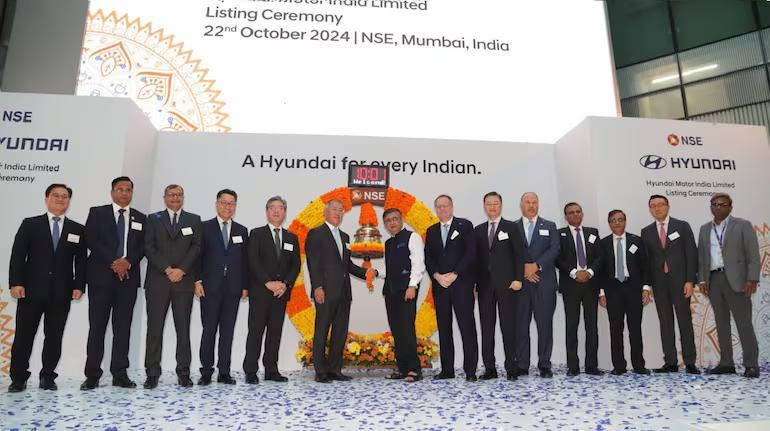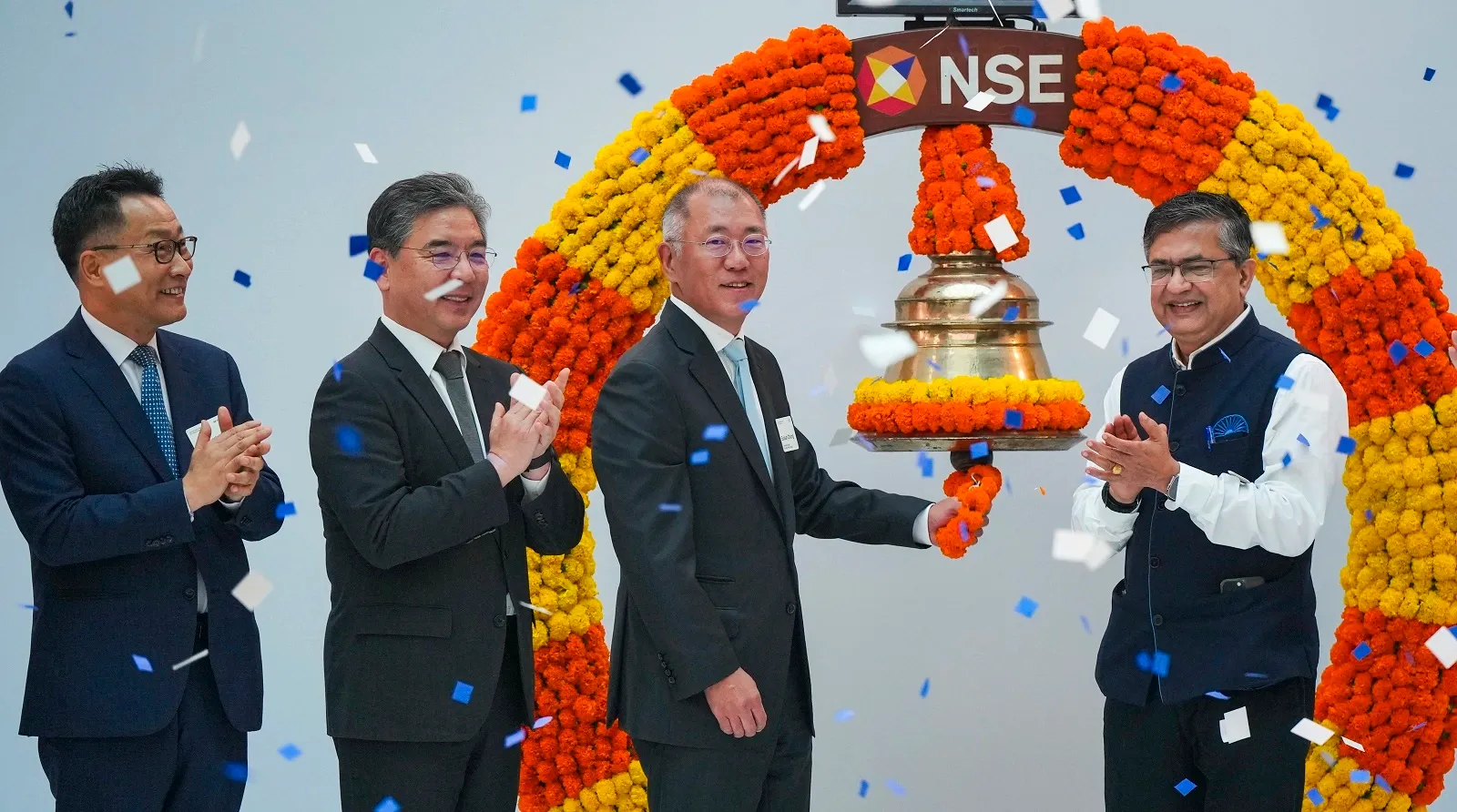With its recent listing on the Bombay Stock Exchange (BSE), Hyundai Motor India has officially become the fifth most valuable automaker in India, achieving a significant milestone in the competitive Indian automobile market.
Hyundai’s market capitalization (MCAP) now stands at Rs 1,47,914.98 crore, positioning it just behind some of the industry’s longstanding giants. Hyundai’s rise in India’s auto sector, the significance of its initial public offering (IPO), and the current market standings of top automakers in India.
Hyundai’s Rise in the Indian Auto Market
Hyundai’s growth trajectory in India has been impressive, thanks to its early entry and consistent commitment to quality and innovation in the Indian market. Since entering India in the late 1990s, Hyundai quickly became a household name with models like the Santro, which captured Indian customers’ attention and loyalty.
Read : India Becomes Third Highest Tourist-Generating Market for Singapore
The brand’s approach to offering a balance between affordability, efficiency, and stylish design made it stand out in a crowded market. Over the years, Hyundai has introduced an array of successful models across various segments, from hatchbacks like the i10 and i20 to SUVs like the Creta and Venue, each of which has garnered significant sales.
Aiding Hyundai’s rise has been its strategic alignment with evolving customer preferences. In recent years, there has been a notable shift in consumer preferences toward compact SUVs and feature-rich vehicles, areas where Hyundai has excelled.
Read : Sorry for Traumatic Experience: Singapore Airlines CEO Goh Choon Phong After 1 Dead, 70 Injured
The Creta, in particular, became one of India’s best-selling SUVs, and the recently launched Hyundai Exter has strengthened Hyundai’s compact SUV lineup. By consistently delivering vehicles that resonate with local preferences and maintaining a vast dealership network, Hyundai has firmly established itself as a key player in India’s auto industry.
The Hyundai IPO: Anticipation and Initial Reaction
Hyundai Motor India’s IPO was one of the most anticipated listings in recent years, not only for its timing but also due to the scale of its offering. This IPO was the largest public offering by a carmaker in India since Maruti Suzuki’s initial share sale in 2003, underscoring Hyundai’s growth and reputation over the past two decades.
Moreover, with an issue price set at Rs 1,960, the Hyundai IPO aimed to capitalize on the company’s solid reputation and expand its reach among Indian investors.
Despite the anticipation, the IPO’s debut on the BSE saw Hyundai listing at Rs 1,931, 1.47% below its issue price. By the close of trading on its first day, the stock ended down by 7.12% at Rs 1,819.60 on the National Stock Exchange (NSE), reflecting a subdued response from investors.

Analysts attribute this lukewarm reaction to several factors, including market volatility and investor caution. However, the historical context and Hyundai’s brand strength suggest that the IPO has laid a solid foundation for long-term value growth.
As Hyundai Motor India establishes itself as a public entity, the focus will likely be on the brand’s ability to navigate competition and leverage its market presence to enhance shareholder value.
It is also noteworthy that Hyundai’s IPO was the largest public offering by a carmaker since LIC’s significant share sale of Rs 21,000 crore. This statistic reflects Hyundai’s determination to expand its market reach and engage with a wider range of investors.
The launch could herald a new chapter for the automaker, with the potential for enhanced growth in a country with one of the world’s largest car markets. As Hyundai begins its journey as a listed company, the challenge lies in meeting investor expectations while continuing to deliver on its established reputation for quality and innovation.
India’s Top Automakers by Market Capitalization
In terms of market capitalization, Hyundai has joined the ranks of the country’s leading automakers, occupying the fifth position. Maruti Suzuki leads the pack as India’s most valuable automaker, with an MCAP of Rs 3,74,796.16 crore.
Known for its extensive lineup of affordable and fuel-efficient vehicles, Maruti Suzuki has consistently maintained a stronghold in the Indian market. With a wide dealership network and a range of models popular among middle-class families, Maruti Suzuki’s market cap reflects its extensive customer base and trusted brand image.
Mahindra & Mahindra follows Maruti Suzuki with an MCAP of Rs 3,58,583.97 crore. Known for its rugged utility vehicles and SUVs, Mahindra has earned a reputation for durability, especially in rural and semi-urban markets. The company’s focus on electric vehicles and sustainable mobility further reinforces its market position.
Tata Motors, another major player in the industry, holds the third position with an MCAP of Rs 3,23,669.61 crore. Tata has recently made headlines for its investment in electric vehicles, aiming to drive the country’s transition to cleaner transportation solutions.
Bajaj Auto ranks fourth with a market cap of Rs 2,89,274.58 crore. Though primarily known for its two-wheelers, Bajaj’s impact on the automobile market is profound, especially in the two-wheeler segment, where it enjoys a significant market share. Bajaj’s expansion into electric two-wheelers and focus on innovation has kept it relevant in a rapidly evolving market.

Hyundai’s entry as the fifth most valuable automaker is a noteworthy development in the Indian auto industry. While Hyundai currently trails behind the top four in terms of market cap, its strong product lineup and ambitious growth plans could help close the gap over time. The company’s continued focus on quality and consumer-centric innovations will be pivotal as it strives to solidify its market position.
Hyundai Motor India’s new status as the fifth most valuable automaker highlights its impact and growing footprint in the Indian automobile industry.
While the IPO may not have had the explosive debut some anticipated, Hyundai’s strong foundation and brand loyalty suggest a promising outlook. By expanding its offerings and focusing on emerging trends like electric vehicles, Hyundai has the potential to grow its market share and valuation.
The competition among India’s top automakers is likely to intensify as each company explores avenues for growth in the changing automotive landscape.
With a continued emphasis on electric and sustainable mobility solutions, the next decade will be transformative for India’s automotive sector. As Hyundai continues to innovate and adapt to market dynamics, its position among India’s automotive giants is secure.

